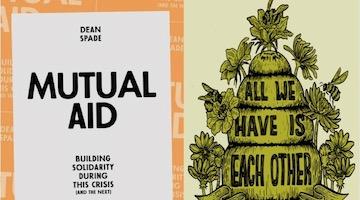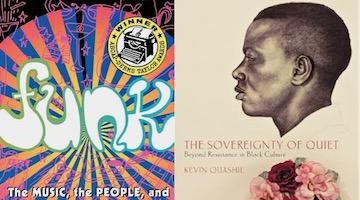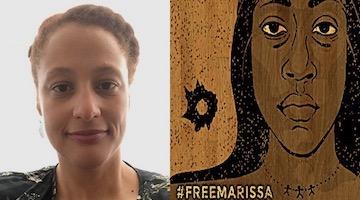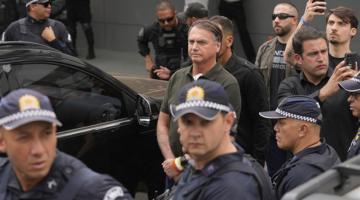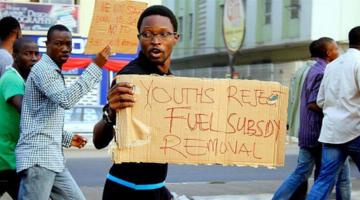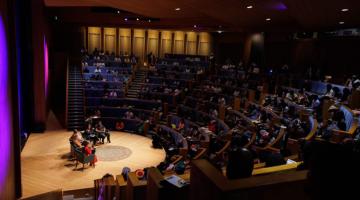This arena of the mutual aid movement is energized by “a vision of the absence of prisons, jails, detention, and criminalization.”
“Paying bail is more than paying ransom.”
In this feature, we ask organizers involved in mutual aid projects to share a little bit about their work. We understand mutual aid work as the part of social movement organizing that meets people's direct needs. Unlike charity work, however, mutual aid is part of a broader strategy to address the root causes of injustice by mobilizing people to dismantle structures of domination and build the world we want.
Mutual aid efforts are proliferating as people respond to the Coronavirus pandemic. You can track emerging projects atmutualaidhub.org, and we recommend checking out this useful guide from Mutual Aid Disaster Relief about how to start COVID-19 mutual aid projects and do the work safely and effectively. We also recommend the Big Door Brigade’s Mutual Aid Toolbox and this shortmutual aid explainer video, for starting conversations about what mutual aid is and why it is a vital tactic to expand right now.
This week, we had the honor of interviewing the Chicago Community Bond Fund.
Dean Spade and Roberto Sirvent: Can you please tell readers of the Black Agenda Report a little about your background and the mutual aid work you have been involved in?
Ash, from Chicago Community Bond Fund: My name is Ash and I’m a Black trans abolitionist originally from Georgia. Most of the support work that I’ve been a part of started after I moved to Chicago for grad school. For almost 8 years now, I’ve been involved with mostly two types of mutual aid projects that have lots of overlap between them. The two types are support work for survivors of domestic violence and intimate partner violence who have been criminalized, and work around abolishing money bail/bond and pretrial detention, which began for me in working with the Chicago Community Bond Fund. One of the first mutual aid projects I was a part of was theChicago Alliance to Free Marissa Alexander or CAFMA (now known as Love & Protect). Mariame Kaba of Project NIA hosted a teach-in in Chicago around Marissa Alexander’s case – Marissa Alexander is a Florida mother who in 2013 was facing 60 years in prison for firing a warning shot against her abusive husband – and several folks signed up to support the case. Especially at that time, I still wasn’t sure what I could contribute to the work to get Marissa Alexander free, and what has become my life’s work to get all people free, but I knew that I could try to do something. Through CAFMA, we ended up doing a lot of things. We raised awareness about the case in the context of the criminalization of survival, we made buttons, posters, and all kinds of merch to sell to contribute to legal fees, folks had parties to raise money for legal fees, and we did a lot of other things.
Around the same time, even though there had been rumblings for awhile, folks were organizing in Chicago to create a community bond fund. A catalyst for the forming of the bond fund was after 17-year-old DeSean Pittman was murdered by Chicago police and eight Black people were arrested during a vigil honoring DeSean’s life. The mothers of the young Black folks arrested, along with local organizers, worked to raise funds to get them out of Cook County jail. It was this group of folks that decided they wanted to keep the fund going. Ultimately, this led to the Chicago Community Bond Fund (CCBF) forming. As a CCBF founding member, I posted the first bond for CCBF in 2015.
“Eight Black people were arrested during a vigil honoring DeSean’s life.”
There are a few other projects that I could expand on here – like working with Love & Protect in Chicago on defense campaigns and letter writing campaigns to folks on the inside, working with Survived & Punished: NYC chapter on developing a commutations campaign to pressure the governor to release survivors of violence, giving rides and doing jail visits with folks on the inside in Bedford Hills prison in NY, court support, working with the Brooklyn Community Bail fund to bail folks out of jails in NYC, and contributing to theTransformative Bail Curriculum held by a bunch of groups including folks in the Movement for Black Lives, and several other examples.
For me, part of what connects all of these mutual aid projects is the breaking of isolation and the extraction of people from different holds of the prison industrial complex. The isolation piece is both between folks who are incarcerated and criminalized with folks on the outside, as well as between those of us on the outside who are constantly challenging these messages that we have to wait for some sort of state actor to support us, when we know we can and have always been doing that work ourselves because we cannot rely on the state. The extraction part, like raising funds to pay for folks’ freedom from cages through CCBF, is also a major part of all of the mutual aid projects I have been involved with. All of these projects are both about how people, and particular people who are Black, who are poor, who are queer, trans, disabled, undocumented, and so forth, are removed from community in very systematic ways, and that part of the goal of many of the mutual aid projects that I have been a part of is to return all of those people back to community with the support of community.
Matthew, from Chicago Community Bond Fund: My name is Matthew and I’m a white anarchist and prison abolitionist originally from Philadelphia. I have been involved in and helped organize mutual aid projects since getting involved in organizing through the Occupy movement. During the Occupy movement, I began to get heavily involved with organizing jail support for protesters after they were arrested. Over time, this began to include organizing court support and bail fundraisers, which is how I got involved with helping start the Chicago Community Bond Fund in 2014 and 2015.
Additionally, I spent several years helping organize a Food Not Bombs chapter in Chicago’s Pilsen neighborhood. Every Sunday, we would work with community members to serve up a free full meal and provide groceries to residents of the neighborhood. In 2014, we took over the parking lot of an abandoned police station to set up a community garden. My experience with Food Not Bombs came in handy in 2016 when the #LetUsBreathe Collective set up an occupation outside Chicago Police’s Homan Square blacksite. For years, Chicago Police had been detaining people off the books inside this nondescript warehouse on Chicago’s west side. For several months, #LetUsBreathe held space where we constructed our abolitionist future in the shadow of the police state. Freedom Square featured a free store and kitchen that served meals to the wider community three times a day. We also provided tents and other resources for the community's houseless population. My organizing has also been centered around the idea that we cannot wait for the world we want to live in, we must be building it while we work to tear down the oppressive conditions we currently live under.
Dean and Roberto: How does CCBF’s work fit into the broader struggle for change you are working on?
CCBF: Chicago Community Bond Fund is an abolitionist organization. We do not believe that prisons and policing make our communities safer. We firmly believe in the “invest/divest” framework put forward by the Movement for Black Lives in their 2016 policy platform. To effectively repair the harm done by mass incarceration, we must not only divest from jails, prisons, and policing, we must invest in resources for the communities most directly impacted by mass incarceration. Financial resources should be redirected to schools, health care, and employment programs.
Ending money bail and pretrial incarceration is a key step in the struggle for abolition. Pretrial incarceration is at the foundation of the prison industrial complex. Every day, people across the country are coerced into taking plea deals simply because they can’t afford to pay a money bail and get back to their communities. Ending money bail will not only reduce the number of people in jail, it will also reduce the number of people being sent to prison. People incarcerated while awaiting trial are more likely to go to prison, receive longer sentences, and are more likely to be rearrested in the future. Ending pretrial incarceration would quite literally knock the foundation out from the prison industrial complex.
Dean and Roberto: How does CCBF’s work mobilize for change rather than merely being a "band aid" on a harmful system?
CCBF: The broader struggle for change for us is all about making our abolitionist visions come to life, and also seeing where those visions already exist and making more of them. Ruth Wilson Gilmore says that abolition is both presence and absence. CCBF’s work is a really good joining of the presence and absence. Bonding someone out is such a tangible thing to do. Talking to folks about the evilness of the prison industrial complex and then giving them something to do like paying bond or showing up for the Coalition to End Money Bond to support the work to abolish money bail and pretrial detention brings folks into movement work, if they want to be brought in. To us, that is the presence of community showing up for people who are extracted from us, with a vision of the absence of prisons, jails, detention, and criminalization.
When the Chicago Alliance to Free Marissa Alexander and other groups were talking about Marissa Alexander’s case, we always talked about it in the context of Black women and femmes having No Selves to Defend. We would talk to folks about this larger context of the prison industrial complex as drivers and enforcers of gender-based violence, and that Marissa Alexander’s story could not be talked about in isolation because it unfortunately was not unique. Marissa Alexander herself was very explicit about wanting folks to be sure that she wasn’t the only person’s story uplifted. Setting her story within those of Joan Little, Cece McDonald, the New Jersey 4, and so many other Black women and femmes who were criminalized for defending themselves helped to connect lots of dots for folks.
“The broader struggle for change for us is all about making our abolitionist visions come to life.”
To us, both of these examples are part of mobilization rather than being a “band-aid.” If folks were just paying bond and not linking the issues with the bond system to pretrial detention and other measures that the state wants to use to keep people locked up in their homes or elsewhere, that would be a band-aid. If folks were paying bond and making a false assumption that that alone would somehow lead to the abolishment of the prison industrial complex, that would be a band-aid. If folks are supporting folks on the inside and not linking their individual stories to larger systemic issues, that would be a band-aid. Paying someone’s bond alone will not get us to the abolitionist future that many of us want. This is partly because the state will continue to try to reinvent itself, especially as we continue to resist. Another issue with “band-aids” is that they run the risk, that we see over and over again, of the state co-opting them and rebranding them as “fixes.” Folks in community bail funds wrote about an example of this when sheriffs in Arkansas celebrated the opening of a bail fund as the “solution” to jail overcrowding. Instead of not arresting people and releasing people, the police, sheriffs, and courts in Arkansas just praised a private philanthropic intervention -- which gives the police, sheriffs, and courts cover, and means they have to do nothing to actually change the system.
Ash: What cannot be understated is how I was brought into this work, which was through a teach-in. Teach-ins are informal discussions or learning opportunities about a topic that have a mobilizing component to them. At the end of teach-ins you are called to do something. All of these projects have that component to them. They are about bringing people in and figuring out how we can use whatever skills or talents or interests or free time or resources to collaborate. To me, that’s also a big part of how we mobilize.
Dean and Roberto: Have you seen dangers of co-optation of the mutual aid work you have done? What structures or methods have the organizations or projects you work with put in place to address that danger?
CCBF: In the last five years, the number of bail funds in the US has grown exponentially. When CCBF began our work less than five years ago, there were three other bail funds in the US; today there are over 60 criminal bail and immigration bond funds. Fortunately, many are grassroots efforts that are engaging this work with an abolitionist praxis. They, too, understand that paying bail is more than paying ransom. In addition to bailing people out, they are also fighting to end money bail and put themselves out of operation. Unfortunately, though, they are not the only ones who have been attracted to this powerful intervention.
Philanthropists and governmental entities have worked to institutionalize bail funds in response to the demand to end money bail. The reality is that we can pay bond until we’re blue in the face, but if we don’t take away the state’s power to incarcerate people because they can’t afford to pay a bond, we’ll be doing it until the end of time. While paying bail for someone who can’t afford it is a powerful act of solidarity, it has diminishing returns in our ability to actually challenge the system. Plenty of studies have already shown that people released pretrial will have better case outcomes and that the vast majority of people do not get rearrested or miss court. In order to challenge the system, we must be in tension with it. In some jurisdictions, the state is adapting to accommodate bail funds or, worse, leveraging them in the reforms they’re enacting.
“Today there are over 60 criminal bail and immigration bond funds.”
Last year, a sheriff in Arkansas applauded the arrival of a national bail fund in their county as a “solution” to unaffordable money bonds. In Cook County, the county board tried to pass an ordinance last year that would have protected bail funds from losing their money while continuing to take the money of Black and Brown community members paying bond for their loved ones. In 2017, New York City worked with philanthropists to start its own bail fund. In effect, New York was funding the arrest, prosecution, and release of people caught in its criminal legal system instead of not arresting or prosecuting them in the first place.
Last year, New York state passed a bail reform law ending the use of money bail for misdemeanors and lower level charges. At the time, NY state law restricted non-profit bail funds to paying only bails of $2,000 or under for misdemeanor charges. As reforms were negotiated and advocates said they did not go far enough, the state planned to modify the charitable bail fund statute to allow them to pay bails on felony cases over $2,000 – so that bail funds could free some of the people left behind by the reforms. In response, the Brooklyn Community Bail Fund stopped paying bail on criminal cases and has focused its efforts on systems change and paying immigration bonds.
If the state is applauding the actions of bail funds or trying to make it easier for them to pay bond without losing money, we have a problem. Philanthropists and well-intentioned community-based charity approaches will not be able to pay our way out of mass incarceration. While Chicago Community Bond Fund continues to pay bond for people who can’t afford it, this is a small part of the work we’re doing to change the system. Helping people currently incarcerated is an important act of community defense, but on it’s own will not end pretrial incarceration.
Dean and Roberto: What are the pitfalls of mutual aid work, from your experience?
CCBF: One pitfall of mutual aid work is that it can sometimes feel like it’s not enough. Right now, when folks are really growing and expanding mutual aid projects at the same time that we are seeing the state both expand carceral frameworks and completely ignore the impacts of the COVID-19 or the coronavirus, mutual aid work can feel inadequate due to the scale of the challenges we face. When we are talking about big systems and institutions that make up the prison industrial complex, we are talking about these giant systems that have an unlimited amount of resources. Part of the “not enough” feeling can come from an internalization of the logics of capitalism and white supremacy, but regardless can feel very real. Supporting a person or some people can feel like not enough when these systems continue to absorb people every day in very vicious ways. Resisting being consumed by these feelings, though, is part of mutual aid work. This is also why collectives and collaboratives and groups that we create together are so important because they can sustain us and help us to resist or continue to make transformations even when we do feel this way.
Another challenge that is not particular to mutual aid work but is required for all liberation work is developing the skills to move through conflict. Conflict is inevitable and will show up in a bunch of ways, but really rooting the work in transformative justice practices will not only push the mutual aid work further but should also be a part of the abolitionist vision. How we struggle together in conflict and how we move through it will put ourselves and our movements in a much better place. It also makes our work more sustainable if we actually face conflict collectively. We have seen and experienced some of the most transformational moments when folks actually confront issues and disagreements in principled ways that are about honoring each other’s humanity and context. Folks who are working on transformative justice and accountability process work have been at the forefront of this and having more folks skilled in this type of work will help us both avoid and move through the inevitable conflicts that will occur.
Another pitfall has to do with treating mutual aid work like “charity,” which it is not and should not be thought of as. Dean Spade talks a lot about mutual aid and how mutual aid is not charity. Mutual aid is about supporting each other and building things together and changing political conditions. Mutual aid shows up when folks in communities bail each other out of jail, participate in organizations likeBlack and Pink that have penpal networks connecting incarcerated folks to folks on the outside, driving family members to jail and prison visits, community defense against ICE, and so much more. Treating this work like charity both invalidates people’s lived experiences and participates in this idea of “trying to do good” while not actually working to change political conditions.
Dean and Roberto: Do you think mutual aid work has any special or particular role in the current conditions/crises?
CCBF: Mutual aid work is always an essential part of organizing. The struggle to tear down the systems of oppression are long and people are currently suffering. We must find ways to reduce harm that further our work to change the current conditions. It is also crucial that these efforts don’t detract from those longer term goals. This is especially true in moments in the wake of natural disasters or crises like the one we’re currently experiencing with the outbreak of COVID-19. Our government has shown us time and time again that it will prioritize the needs of corporations and industry over those of everyday people. If we do not set-up our own structures to love and support our most vulnerable community members, no one else will.
As we’ve previously stated, mutual aid organizing helps people realize their collective power. The realization of that power is important to committing one’s self to long protracted struggle.
Dean and Roberto: Do you have ideas about how mutual could expand or mobilize more people?
CCBF: Harm reduction is essential to supporting those most impacted by our racist capitalist system while working towards tearing down that system of oppression. So much organizing requires long protracted struggle; many campaigns take years to reach their goals, if they ever do.
Mutual aid projects allow us to peel back the curtain and see the world that we’re fighting for and experience it in real time. Projects likeCommon Ground, organized to respond to Hurricane Katrina, and Occupy Sandy, organized in response to Hurricane Sandy show us what is possible. Community members built massive grassroots efforts to take care of each other in response to these tragic events. Together, they dealt head on with a crisis when the state failed to respond. People who participate in these efforts or ones like them are forever changed. In these grassroots responses to crisis, many people find out for the first time what it’s like to be a part of a healthy community that loves and supports each other.
Mutual aid work is a great way for people to feel the power of collective action in real time and to keep them inspired and invested in the movement for the long haul. Often, society wants us to believe that we need solutions to our problems to come from governmental agencies or so-called experts. Mutual aid projects allow community members to realize their collective power, recognize the expertise of their lived experiences, and build tighter connections across their communities.
Dean and Roberto: Are there any examples of other mutual aid work, historical or contemporary, that particularly inspire you or that you have used as a model?
CCBF: The Black Panther Party’s free breakfast program is a lasting example. Of course bail and bond funds, both funds like CCBF and broader efforts like National Bail Out, as well as just every day folks who collectively resource their money to get people out inspire us. On a more micro-level, the Bay Area Transformative Justice Collaborative’s pod mapping resource can inform the conversations we have in our personal lives. It’s really important that we continue to build networks of people that can hold us if/when we need support around harm or violence, and pod mapping is a really good resource to encourage folks to think about who “community” really is to them and to encourage us to have conversations with people who are in our community so that we can continue to build up the support networks we need in order to not rely on the state if/when harm and violence happens interpersonally. Cop watch initiatives and court support groups across the country are also examples. During the Chicago Teachers Union strikes, supporters created childcare networks and brought strikers food so that they could stay on the line. The Sylvia Rivera Law Project Prisoner Advisory Committee supports low-income incarcerated people and people of color who are transgender, intersex, or gender non-conforming. Survived and Punished raises funds for commissary for survivors who are incarcerated and continues to break the isolation that is felt by folks being locked in cages. Survived and Punished has also created and shared many resources on how to start defense campaigns. The Black Trans Travel Fund provides Black trans women with the financial resources that they need to be able to navigate safer alternatives to travel, which hopefully makes it less likely that they will experience harm and violence. Many of us also need to work harder to incorporate a disability justice frame into our mutual aid work and center the work that folks in disabilities communities are doing. There are so many examples, many of which are collected on the Big Door Brigade website. Especially in a time where we have to be more physically isolated due to urgent global health conditions, it is particularly important to keep dreaming up ways to support each other through mutual aid.
Dean and Roberto: What can readers of the Black Agenda Report do to support your work?
CCBF: People can sign-up for CCBF’s newsletter and the newsletter for the Coalition to End Money Bond to learn about how they can support our campaign to end money bail and pretrial incarceration in Illinois. You can also donate to our work here.
Dean Spade is the creator of the mutual aid toolkit at bigdoorbrigade.com. He has been working in various poverty-focused and abolitionist mutual aid projects for the past 20 years. He is the author of Normal Life: Administrative Violence, Critical Trans Politics and the Limits of Law (Duke University Press 2015). His video projects and writing are available atdeanspade.net.
Roberto Sirvent is Professor of Political and Social Ethics at Hope International University in Fullerton, CA, and an Affiliate Scholar at Yale University’s Interdisciplinary Center for Bioethics, where he directs the Race, Bioethics, and Public Health Project. He is co-author, with fellow BAR contributor Danny Haiphong, of the book, American Exceptionalism and American Innocence: A People’s History of Fake News—From the Revolutionary War to the War on Terror.
COMMENTS?
Please join the conversation on Black Agenda Report's Facebook page at http://facebook.com/blackagendareport
Or, you can comment by emailing us at comments@blackagendareport.com

